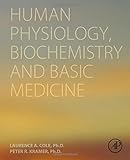Human physiology, biochemistry, and basic medicine / Laurence A. Cole, Peter R. Kramer.
Material type: TextPublisher: Amsterdam ; Boston : Elsevier/AP, Academic Press is an imprint of Elsevier, [2016]Copyright date: ©2016Description: xi, 236 pages : illustrations ; 25 cmContent type:
TextPublisher: Amsterdam ; Boston : Elsevier/AP, Academic Press is an imprint of Elsevier, [2016]Copyright date: ©2016Description: xi, 236 pages : illustrations ; 25 cmContent type: - text
- rdamedia
- volume
- 9780128036990
- 0128036990
- 612 23 C.L.H.
| Item type | Current library | Call number | Status | Date due | Barcode | Item holds |
|---|---|---|---|---|---|---|
 Books
Books
|
Media and mass communication Library | 612 C.L.H. | Available | M0000093 | ||
 Books
Books
|
Media and mass communication Library K2 | 612 C.L.H. | Available | M0000095 | ||
 Books
Books
|
Media and mass communication Library | 612 C.L.H. | Available | M0000094 |
Includes bibliographical references and index.
Title page; Table of Contents; Copyright; Preface; 1: Human Body Formed by Units; Introduction; Chapter 1.1: The Cell; Abstract; The Plasma Membrane; Nucleus and Nucleolus; Rough Endoplasmic Reticulum and Ribosomes; Smooth Endoplasmic Reticulum; Golgi Apparatus; Lysosomes; Mitochondrion; Microtubules and Centrioles; Cells, Cells, and More Cells; Chapter Keywords; Internet References; Chapter Quiz; Chapter 1.2: Human Chemistry; Abstract; Chapter Keywords; Internet References; Chapter Quiz; Chapter 1.3: Sugars, Fatty Acids, and Energy Biochemistry; Abstract; Chapter Keywords; Internet ReferencesChapter Quiz; Chapter 1.4: Amino Acid Metabolism; Abstract; Chapter Keywords; Internet References; Chapter Quiz; Chapter 1.5: DNA and Human Genetics; Abstract; Replication; Transcription; mRNA Splicing; Translation of mRNA; Genes and Chromosomes; Chapter Keywords; Internet References; Chapter Quiz; Chapter 1.6: Protein Structure and Folding; Abstract; Chapter Keywords; Internet References; Chapter Quiz; 2: Human Frames; Introduction; Chapter 2.1: The Skeleton; Abstract; Chapter Keywords; Internet References; Chapter Quiz; Chapter 2.2: Skin, Ligaments, and Muscles; Abstract
SkinLigaments and Connective Tissue; Muscles; Key Muscles; Chapter Keywords; Internet References; Chapter Quiz; Chapter 2.3: Apoptosis, Growth, and Aging; Abstract; Chapter Keywords; Internet References; Chapter Quiz; 3: Human Organs; Introduction; Chapter 3.1: The Endocrine System; Abstract; Hypothalamus-Anterior Pituitary Axis; Posterior Pituitary; Thyroid Gland; Adrenal Cortex; Adrenal Medulla; Pancreatic Islets of Langerhans Cells; Renin-Angiotensin System; Gonads; Chapter Keywords; Internet References; Chapter Quiz; Chapter 3.2: The Heart and Lungs; Abstract; The Heart; Arteries and VeinsThe Lungs; Chapter Keywords; Internet References; Chapter Quiz; Chapter 3.3: The Circulation; Abstract; The Blood; Erythrocytes; The Immune System; Coagulation; Chapter Keywords; Internet References; Chapter Quiz; Chapter 3.4: Brain and Nervous System; Abstract; The Nervous System; The Brain; Chapter Keywords; Internet References; Chapter Quiz; Chapter 3.5: Seeing, Hearing, Tasting, Smelling, and Touching; Abstract; Seeing; Hearing; Tasting; Smelling; Touching; Chapter Keywords; Internet References; Chapter Quiz; Chapter 3.6: The Liver and Digestive System; Abstract
DigestionLiver; Chapter Keywords; Internet References; Chapter Quiz; Chapter 3.7: The Kidney Filtration System; Abstract; Chapter Keywords; Internet References; Chapter Quiz; Chapter 3.8: Sex and Reproductive Systems: Male; Abstract; Hormones of Male Reproduction; Spermatogenesis; Erection and Ejaculation; Sex and the Human Brain; Chapter Keywords; Internet References; Chapter Quiz; Chapter 3.9: Sex and Reproductive Systems: Female; Abstract; Anterior Pituitary Hormone Production; Oogenesis; Ovulation; Corpus Luteum; Brain and Sex; Chapter Keywords; Internet References; Chapter Quiz
Available on campus and off campus with authorized login.
Human Physiology, Biochemistry and Basic Medicine is a unique perspective that draws together human biology, physiology, biochemistry, nutrition, and cell biology in one comprehensive volume. In this way, it is uniquely qualified to address the needs of the emerging field of humanology, a holistic approach to understanding the biology of humans and how they are distinguished from other animals. Coverage starts with human anatomy and physiology and the details of the workings of all parts of the male and female body. Next, coverage of human biochemistry and how sugars, fats, and amino acids are made and digested is discussed, as is human basic medicine, covering the science of diseases and human evolution and pseudo-evolution. The book concludes with coverage of basic human nutrition, diseases, and treatments, and contains broad coverage that will give the reader an understanding of the entire human picture. -- Provided by publisher.

There are no comments on this title.